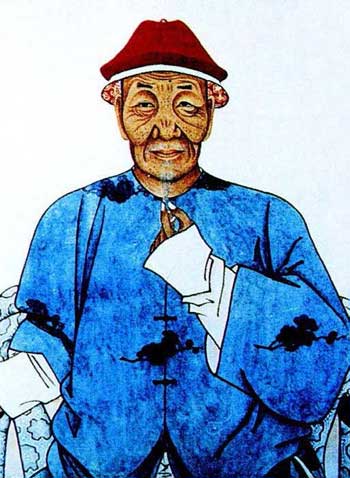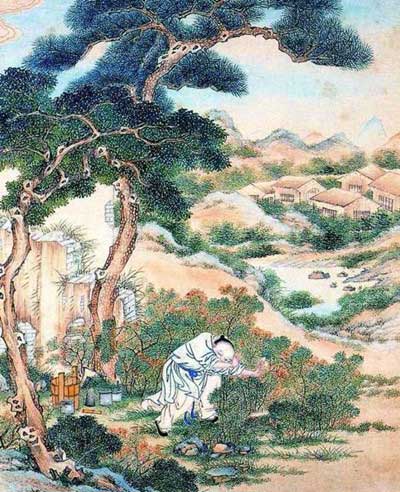- +86-13267351235
- info@globalstourtravels.com
In the 17th century, a glorious romantic ghost novel emerged in China. It spread widely in the form of hand-written copies at first, was performed on the stage of traditional Chinese opera later, and now has been adapted to films and TV series deeply loved by people. This is Strange Stories from a Chinese Studio, a collection of short novels written in classical Chinese in the Qing Dynasty. Its author was Pu Songling (1640-1715), a native of Zibo, Shandong, called Mr. Liaozhai by people after the name of his studio.
Strange Stories from a Chinese Studio (A Chinese Studio for short) is usually called Stories of Ghosts and Foxes consisting of 12 chapters and 491 stories with diversified contents on a wide range of themes. Most works in the book are stories about spirits, monsters, ghosts and goblins. The book recording strange stories is named after the name of the author's studio. Pu Songling created Strange Stories from a Chinese Studio on the basis of extensively gathering folk ghost stories, unofficial history and miscellaneous talks.

Many works in A Chinese Studio expose the dark reality of the feudal society and reflect corrupt officials' atrocities of taking bribes, perverting justice and tyrannizing people. Representatives of such works mainly include Xi Fangping, Dream of Wolves, The Cricket, etc. Xi Fangping describes the miserable experiences of the family of Xi Lian and Xi Fangping. Because the grudge between Xi Lian and Yang from a rich family in the village, Yang bribes officials in the afterworld after death and causes Xi Lian to die in injustice. Xi Lian's son Xi Fangping knows his father's death in injustice very well, so he appeals for justice in the afterworld. However, Yang continues to bribe officials in the afterworld and buys over the king of the afterworld. They torture Xi Fangping cruelly, but Xi Fangping is always firm and unyielding and never gives in.
The imperial examination system born in the Sui and Tang dynasties was already full of abuses in the Ming and Qing dynasties. Pu Songling had an in-depth understanding of this. He was well-read in the Book of Songs and the Book of History, knowledgeable and very creative, but he failed in many imperial examinations while those dandies smoothly became officials through bribing examiners. The cruel social reality made Pu Songling extremely disappointed about the imperial examination system, so he wrote a series of works represented by The Bureau of Examination Frauds, The Certifier of Articles, Scholar Ye, Ghost-Scholar Yu Qu-E, Jia Fengzhi and Scholar Wang Zi-An to expose and satirize the dark side of the feudal imperial examination system. In The Certifier of Articles, a blind monk can smell whether an article is good or bad, so Wang Pingzi asks him to authenticate his article. After smelling the article, the blind monk says Wang Pingzi is highly accomplished and can pass the examination. After some time, Yu Hangsheng consults the blind monk, and the blind monk judges he cannot pass the examination. However, the list of successful candidates released after several days includes Yu Hangsheng but not Wang Pingzi. The blind monk sighs with emotion, "Though my eyes are blind, my nose is not," but the chief examiner's eyes and nose are both blind. This is undoubtedly a biting satire on the imperial examination system.
"Love is man's eternal theme." Works eulogizing pure love are most numerous in Strange Stories from a Chinese Studio. These works boldly eulogize beautiful love between young men and women and express discontent with feudal marriage, represented by Lotus Fragrance, Fragrant Jade, Yingning, etc. Fragrant Jade describes the story of the acquaintance and love between Huang Sheng and a peony spirit. The white peony passionately loved by Huang Sheng dies after being removed. Feeling extremely sad, Huang Sheng writes 50 poems and complains in tears day and night. Unexpectedly, the white peony revives, but Huang Sheng becomes a peony staying beside the white peony day and night. The author passionately eulogized such true love "startling the universe and moving the gods."
In the vast Chinese ancient literature, Strange Stories from a Chinese Studio with its unique artistic charm has a style of its own. The most prominent aspect is that its expression methods are novel and special. The work reflects real life of that period through unreal stories of flower and fox spirits. Most of these flower and fox spirits "have human feelings," with not only the features of their natural archetypes, but also human emotions. There are many flower and fox spirits in Strange Stories from a Chinese Studio. The author's general attitude towards them is in favor of them. Many fox spirits have beautiful faces and graceful postures with the characters of innocence, kindheartedness, bravery and wisdom.

The Cricket tells the story of an ordinary family's overwhelming joy and sorrow from offering crickets as tribute to the imperial court.
Most stories in Strange Stories from a Chinese Studio have plots full of twists and turns. Lu Xun's evaluation is "recording strange stories by means of legends." the so-called "means of legends" refers to legends' "great momentum and flowery language," making stories' plots full of twists and turns, making narrations more exciting and making writing techniques more mature. In terms of language, words used in Strange Stories from a Chinese Studio are subtle and refined. Oral language, slang and the Shandong dialect are often introduced, making the overall linguistic style vivid, elegant, unconventional and very expressive in terms of description of people and depiction of concrete objects.
There are more than 400 stories in total and no less than 100 vivid characters with distinctive personalities, especially many lovely women's images, in Strange Stories from a Chinese Studio. Some of them are fox spirits, some are flower spirits, some are affectionate, and some have strong emotions, giving out charming fragrance and touching glory. For example, the fox spirit Xiaocui is warmhearted and outgoing, Qing Feng is shy and clever, Yingning is simple and honest, Bai Qiulian is elegant...
When talking about the reason why he created Strange Stories from a Chinese Studio, Pu Songling said, "I sew together the finest fragments of fox fur to make a fur coat and want to continue Records of the Hidden and the Visible Worlds; I drink wine with a big cup to write a book similar to Solitary Indignation. Such hope makes me feel very sad!" Though he never achieved his ambition in his lifetime, his Strange Stories from a Chinese Studio was widely spread among people and highly evaluated by later scholars. Modern writer Lao She praised this book, saying "ghosts and fox have personalities, and jokes and reproaches form essays;" Guo Moruo also highly praised this book, saying "ghosts and spirits are depicted better than others and corruption and brutality are satirized bitterly."